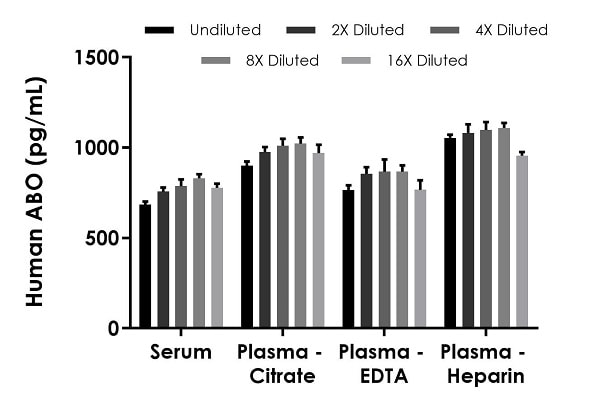Human ABO ELISA Kit (Histo-Blood Group ABO System Transferase) (ab270207)
Key features and details
- One-wash 90 minute protocol
- Sensitivity: 8 pg/ml
- Range: 31.25 pg/ml - 2000 pg/ml
- Sample type: Cit plasma, EDTA Plasma, Hep Plasma, Serum
- Detection method: Colorimetric
- Assay type: Sandwich (quantitative)
- Reacts with: Human
Overview
-
Product name
Human ABO ELISA Kit (Histo-Blood Group ABO System Transferase)
See all ABO kits -
Detection method
Colorimetric -
Precision
Inter-assay Sample n Mean SD CV% Serum 8 2.2% -
Sample type
Serum, Hep Plasma, EDTA Plasma, Cit plasma -
Assay type
Sandwich (quantitative) -
Sensitivity
8 pg/ml -
Range
31.25 pg/ml - 2000 pg/ml -
Recovery
Sample specific recovery Sample type Average % Range Serum 96 % - % Hep Plasma 102 % - % EDTA Plasma 101 % - % Cit plasma 102 % - % -
Assay time
1h 30m -
Assay duration
One step assay -
Species reactivity
Reacts with: Human -
Product overview
Human ABO ELISA Kit (Histo-Blood Group ABO System Transferase) (ab270207) is a single-wash 90 min sandwich ELISA designed for the quantitative measurement of ABO (Histo-Blood Group ABO System Transferase) protein in edta plasma, serum, cit plasma, and hep plasma. It uses our proprietary SimpleStep ELISA® technology. Quantitate Human ABO (Histo-Blood Group ABO System Transferase) with 8 pg/ml sensitivity.
SimpleStep ELISA® technology employs capture antibodies conjugated to an affinity tag that is recognized by the monoclonal antibody used to coat our SimpleStep ELISA® plates. This approach to sandwich ELISA allows the formation of the antibody-analyte sandwich complex in a single step, significantly reducing assay time. See the SimpleStep ELISA® protocol summary in the image section for further details. Our SimpleStep ELISA® technology provides several benefits:
- Single-wash protocol reduces assay time to 90 minutes or less
- High sensitivity, specificity and reproducibility from superior antibodies
- Fully validated in biological samples
- 96-wells plate breakable into 12 x 8 wells stripsA 384-well SimpleStep ELISA® microplate (ab203359) is available to use as an alternative to the 96-well microplate provided with SimpleStep ELISA® kits.
-
Notes
ABO, Histo-Blood Group ABO System Transferase, is a glucosyltransferase that is the key determinant of an individual’s blood type. This enzyme transfers UDP-GalNAC or UDP-Gal to H-antigen which results in A, B, or AB blood type. The antibodies for this kit were raised against recombinant protein representing the lumenal domain of the mature protein. The immunogen for this kit does not share high sequence similarity with mouse or rat ABO protein and is not expected to cross-react. However, this protein is homologous to primate ABO.
Abcam has not and does not intend to apply for the REACH Authorisation of customers’ uses of products that contain European Authorisation list (Annex XIV) substances.
It is the responsibility of our customers to check the necessity of application of REACH Authorisation, and any other relevant authorisations, for their intended uses. -
Platform
Pre-coated microplate (12 x 8 well strips)
Properties
-
Storage instructions
Store at +4°C. Please refer to protocols. -
Components 1 x 96 tests 10X Human Human ABO (Histo-Blood Group ABO System Transferase) Capture Antibody 1 x 600µl 10X Human Human ABO (Histo-Blood Group ABO System Transferase) Detector Antibody 1 x 600µl 10X Wash Buffer PT (ab206977) 1 x 20ml 5X Cell Extraction Buffer PTR (ab193970) 1 x 10ml Antibody Diluent CPI - HAMA Blocker (ab193969) 1 x 6ml Human Human ABO (Histo-Blood Group ABO System Transferase) Lyophilized Recombinant Protein 2 vials Plate Seals 1 unit Sample Diluent NS (ab193972) 1 x 12ml SimpleStep Pre-Coated 96-Well Microplate (ab206978) 1 unit Stop Solution 1 x 12ml TMB Development Solution 1 x 12ml -
Research areas
-
Function
This protein is the basis of the ABO blood group system. The histo-blood group ABO involves three carbohydrate antigens: A, B, and H. A, B, and AB individuals express a glycosyltransferase activity that converts the H antigen to the A antigen (by addition of UDP-GalNAc) or to the B antigen (by addition of UDP-Gal), whereas O individuals lack such activity. -
Pathway
Protein modification; protein glycosylation. -
Sequence similarities
Belongs to the glycosyltransferase 6 family. -
Domain
The conserved DXD motif is involved in cofactor binding. The manganese ion interacts with the beta-phosphate group of UDP and may also have a role in catalysis. -
Post-translational
modificationsThe soluble form derives from the membrane form by proteolytic processing. -
Cellular localization
Golgi apparatus > Golgi stack membrane. Secreted. Membrane-bound form in trans cisternae of Golgi. Secreted into the body fluid. - Information by UniProt
-
Alternative names
- A transferase
- Abo
- B transferase
see all -
Database links
- Entrez Gene: 28 Human
- Omim: 110300 Human
- SwissProt: P16442 Human
- Unigene: 654423 Human
Images
-
SimpleStep ELISA technology allows the formation of the antibody-antigen complex in one single step, reducing assay time to 90 minutes. Add samples or standards and antibody mix to wells all at once, incubate, wash, and add your final substrate. See protocol for a detailed step-by-step guide.
-
The ABO standard curve was prepared as described in Section 10. Raw data values are shown in the table. Background-subtracted data values (mean +/- SD) are graphed.
-
The concentrations of ABO were measured in duplicates, interpolated from the ABO standard curves and corrected for sample dilution. Undiluted samples are as follows: serum 50%, plasma (citrate) 50%, plasma (EDTA) 50%, and plasma (heparin) 50%. The interpolated dilution factor corrected values are plotted (mean +/- SD, n=2). The mean ABO concentration was determined to be 768 pg/mL in serum, 976 pg/mL in plasma (citrate), 824 pg/mL in plasma (EDTA), and 1,059 pg/mL in plasma (heparin).
-
To learn more about the advantages of recombinant antibodies see here.














